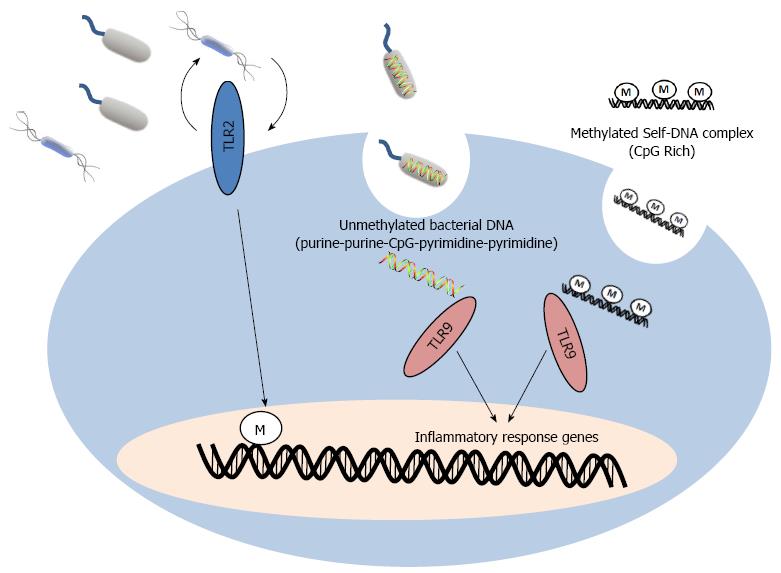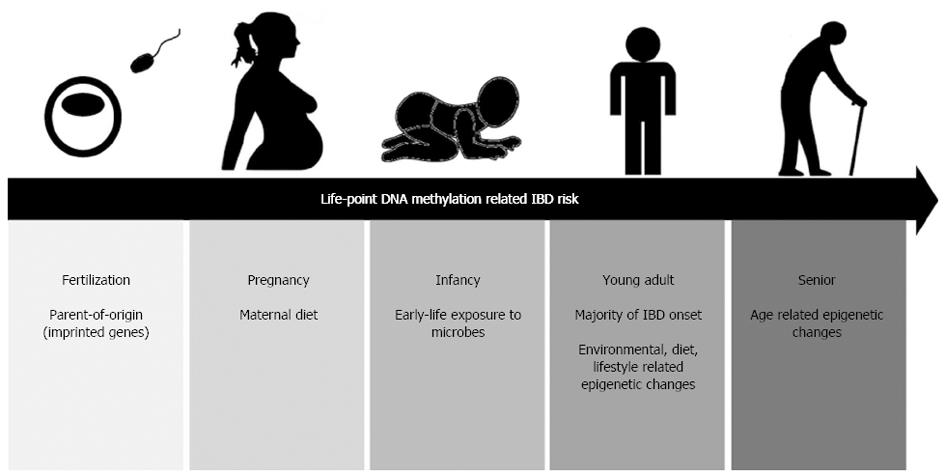Copyright
©2013 Baishideng Publishing Group Co.
World J Gastroenterol. Aug 28, 2013; 19(32): 5238-5249
Published online Aug 28, 2013. doi: 10.3748/wjg.v19.i32.5238
Published online Aug 28, 2013. doi: 10.3748/wjg.v19.i32.5238
Figure 1 Potential relative expression levels of DNA methyltransferase in active-ulcerative colitis, inactive-ulcerative colitis, inflammatory bowel disease-associated colorectal cancer and sporadic-colorectal cancer patient specimens consolidate from several studies.
DNA methyltransferase (DMNTs) is primarily responsible for DNA methylation maintenance, whereas DNMT3A/B have additional roles in de novo DNA methylation and demethylation functions. The relative DNMTs expressions were built on consolidated reports that were normalized to healthy controls to display potential relative expression in different inflammatory bowel disease associated diseases. UC: Ulcerative colitis; IBD-CRC: Inflammatory bowel disease-associated colorectal cancer.
Figure 2 Host genetics and epigenetics alterations by commensal bacterial and self-DNA.
Alterations in intestinal microflora or host pathogen recognition functions, such as toll-like receptor (TLR)2, directly affect host DNA methylation. Endocytosis of bacterial and release of unmethylated bacterial DNA into host cell triggers inflammatory response via TLR9. Strong activation requires a purine-purine-CpG-pyrimidine-pyrimidine bacterial DNA motif. Endocytosis of CpG rich methylated self-DNA also activates TLR9 to induce similar inflammatory response via TLR9, but with on a less magnitude compared to stimulation via bacterial DNA.
Figure 3 Life-stages with an impact on epigenetic changes that increase inflammatory bowel disease risk.
Alterations in DNA methylome in inflammatory bowel disease (IBD) pathogenesis begin right from the fertilized egg. The risk alleles are inherited, and its expression is dependent on the parent-of-origin (imprinting). Maternal diet during pregnancy may also potentially alter the fetal IBD-associated-methylome. Exposures to certain microbes during infancy can also have lasting effects on DNA methylation alteration towards IBD susceptibility. Environment-, lifestyle- and diet- associated DNA methylation changes are important aspects during young adulthood where the majority of IBD onset occurs.
- Citation: Low D, Mizoguchi A, Mizoguchi E. DNA methylation in inflammatory bowel disease and beyond. World J Gastroenterol 2013; 19(32): 5238-5249
- URL: https://www.wjgnet.com/1007-9327/full/v19/i32/5238.htm
- DOI: https://dx.doi.org/10.3748/wjg.v19.i32.5238











